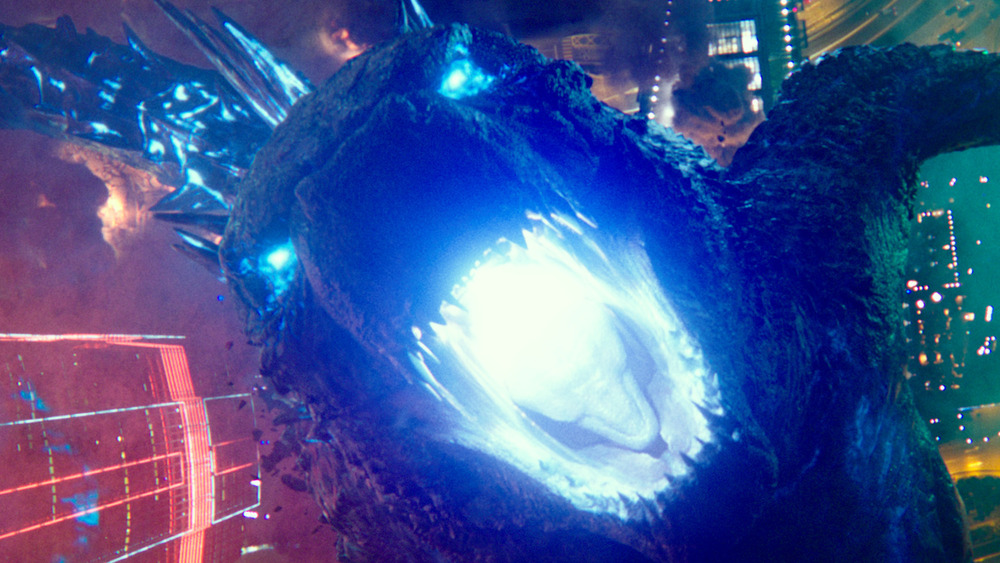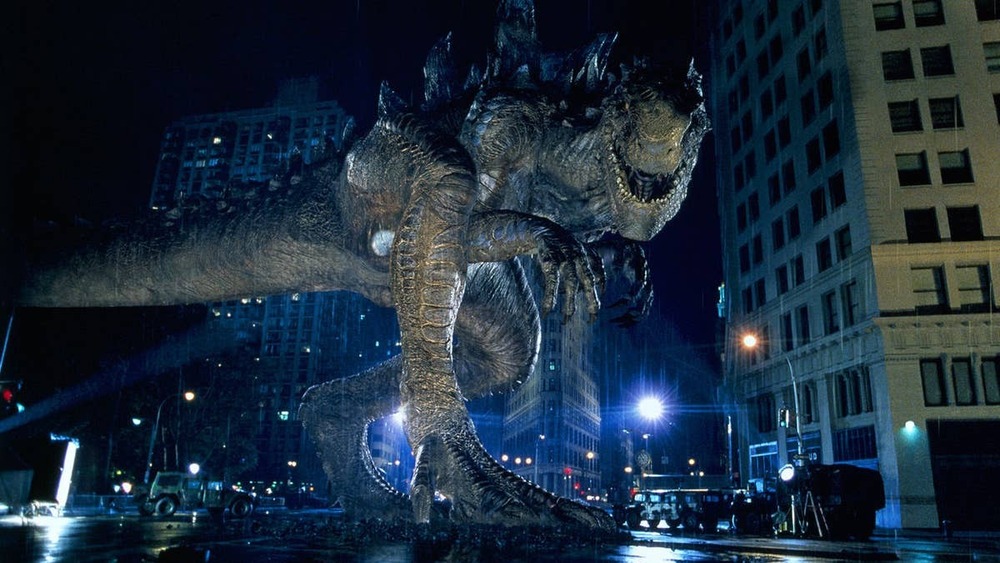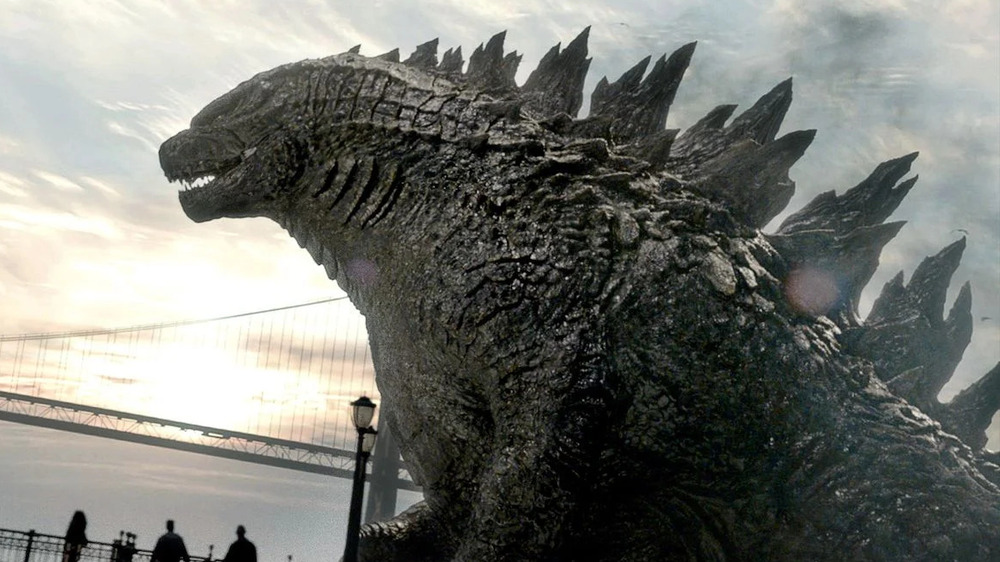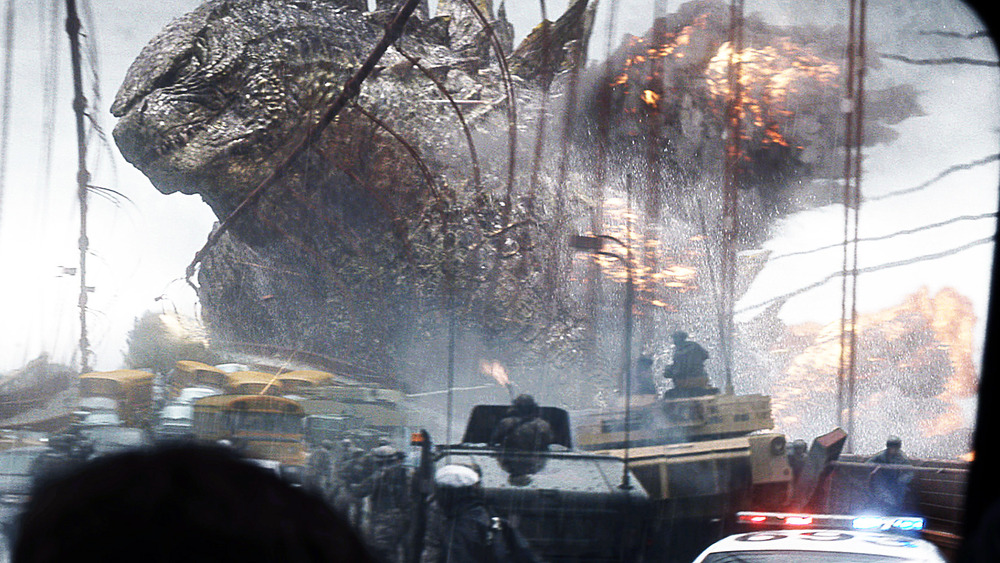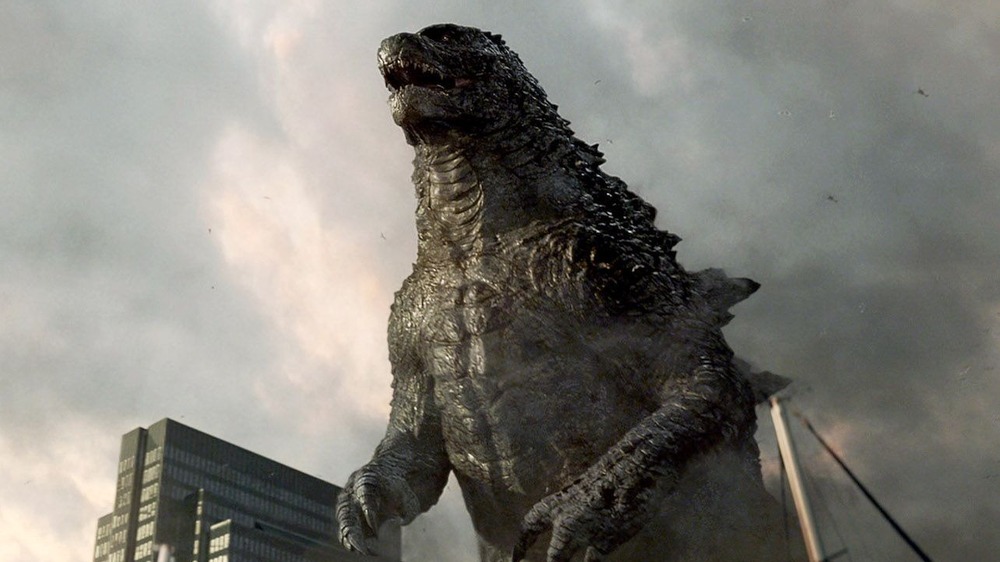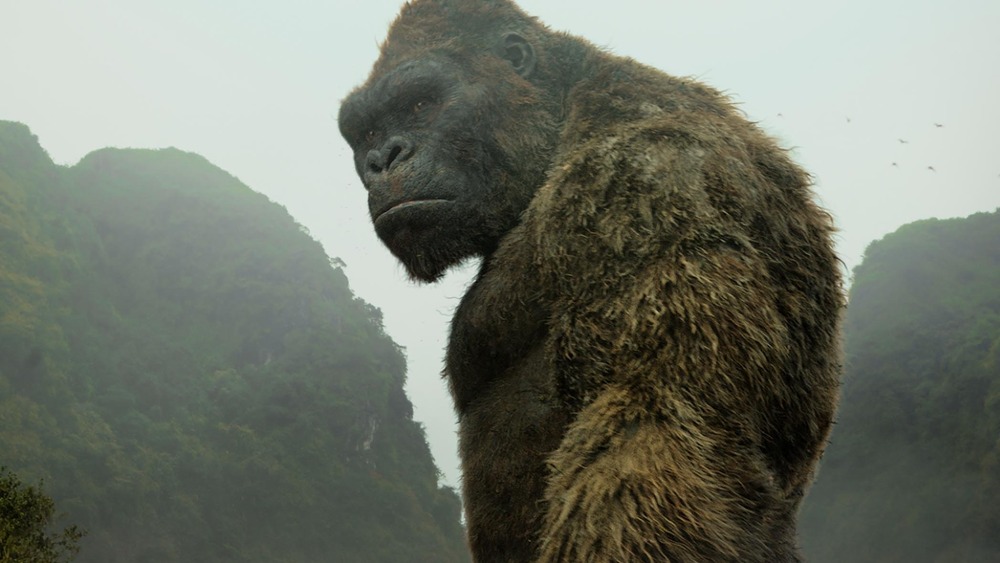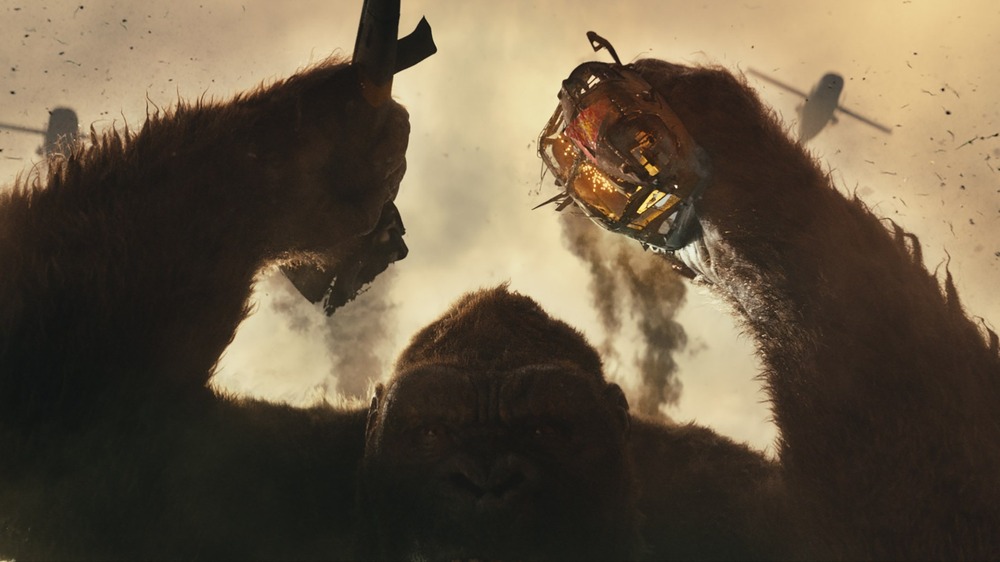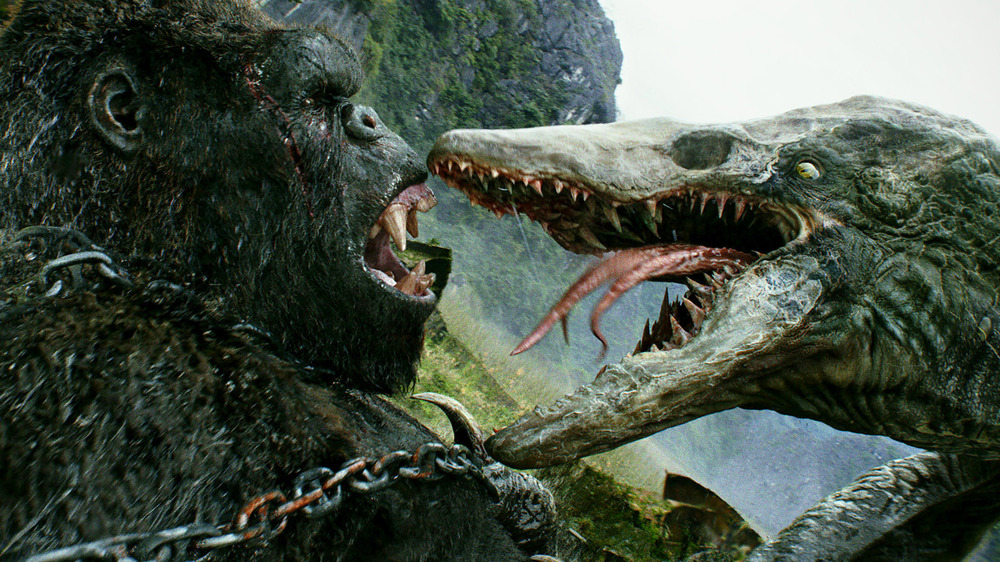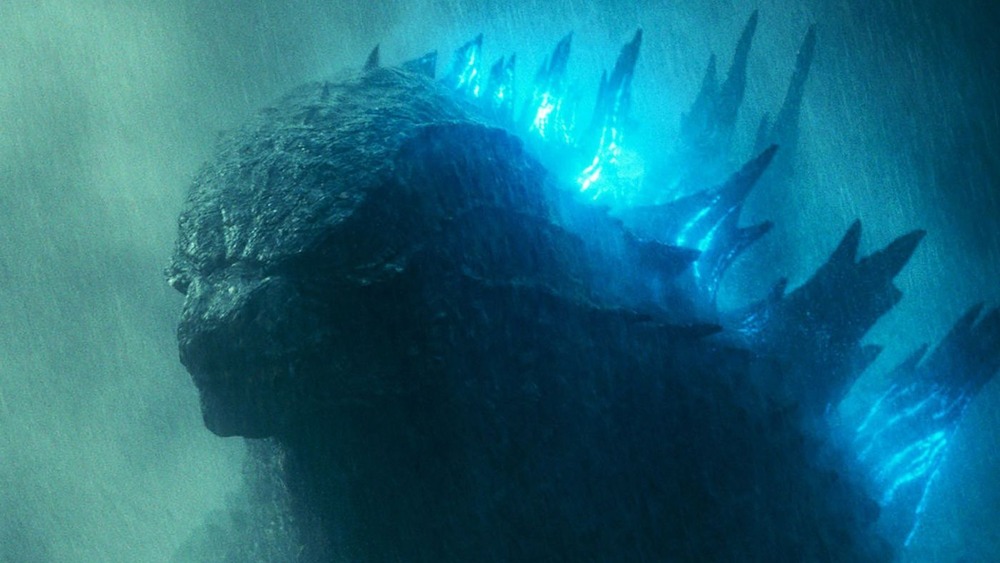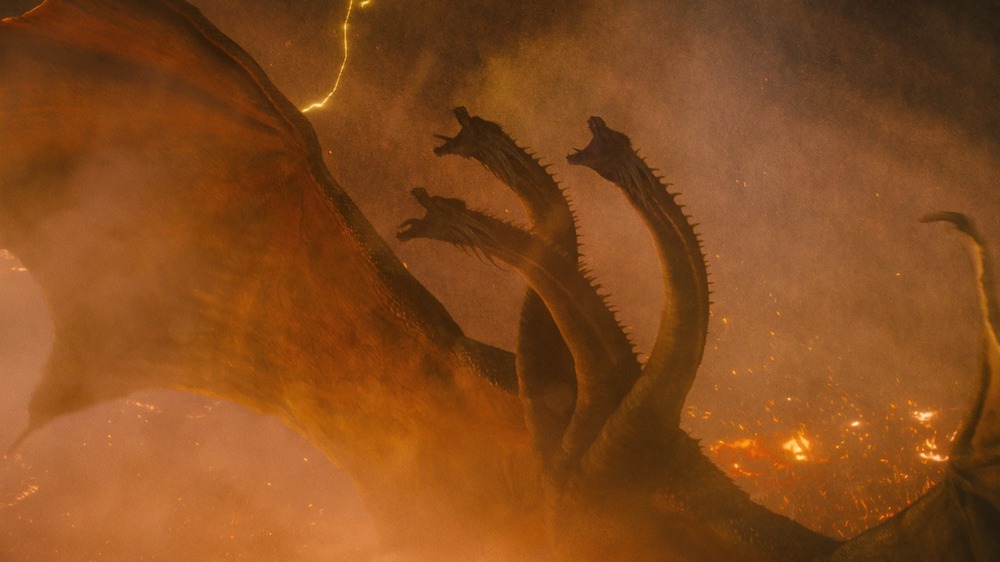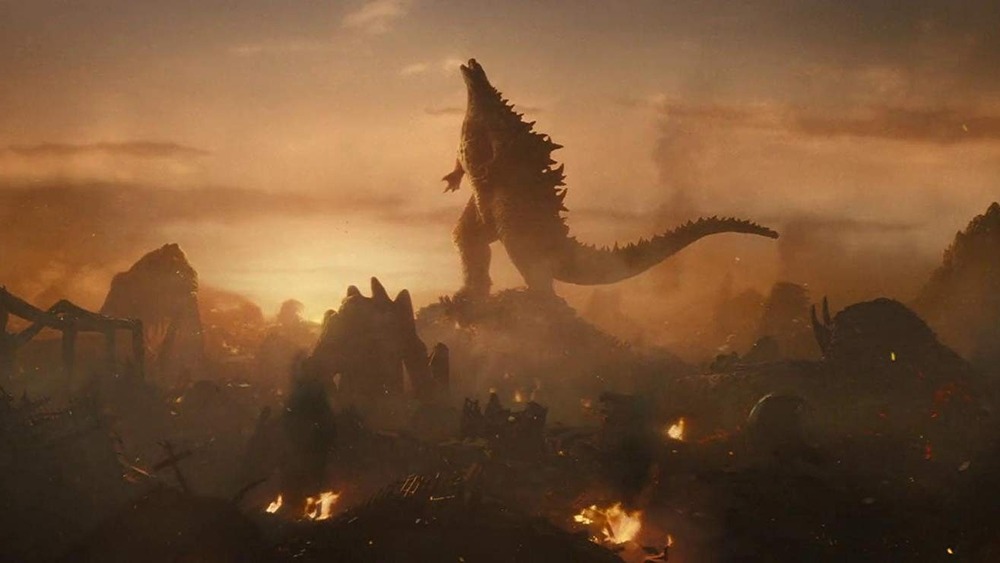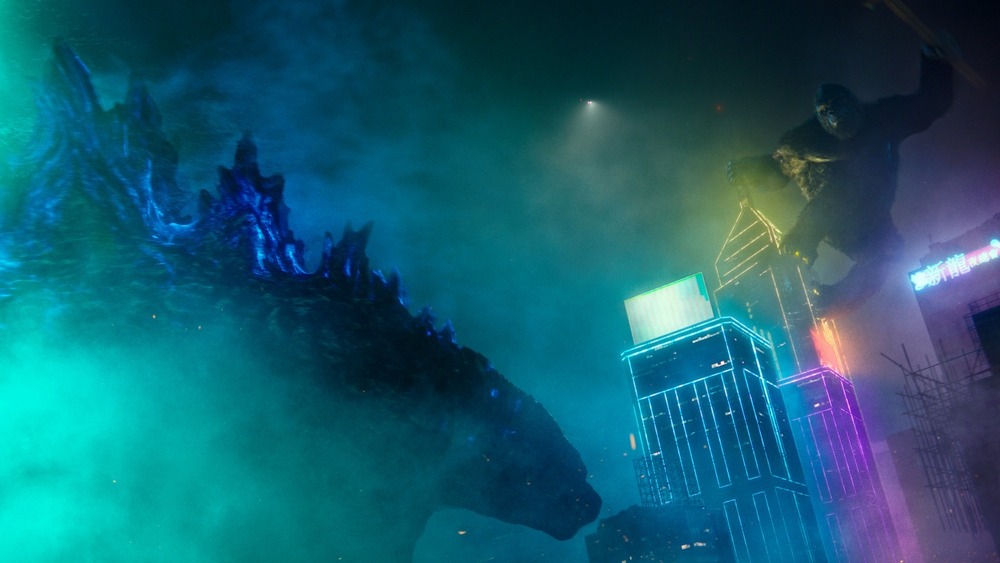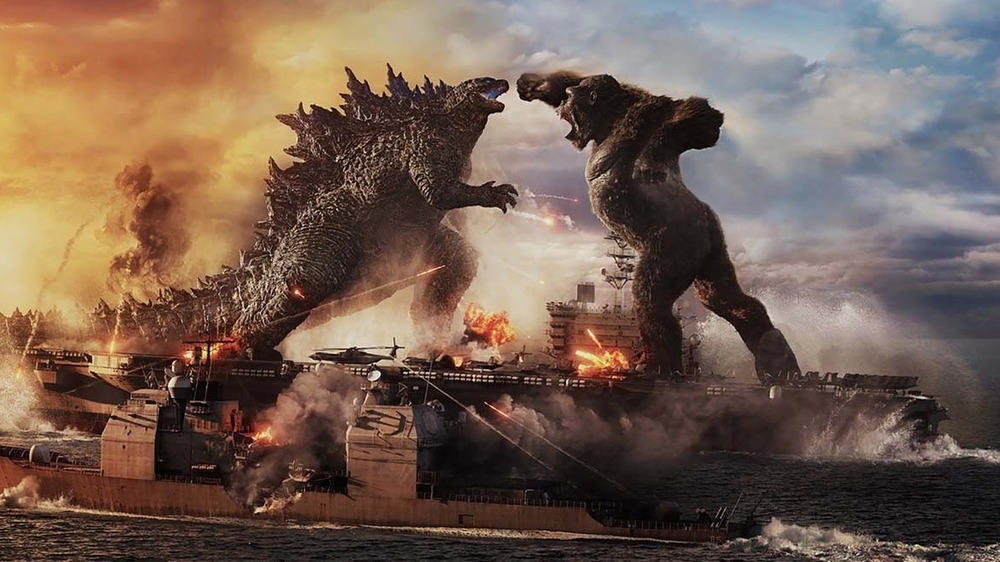The Box Office History Of The MonsterVerse
If you click a link and buy a product or service from a merchant, we may be paid an affiliate commission.
Modern cinema is littered with cinematic universes that didn't work. The initial plans for the DC Extended Universe, for instance, had to be readjusted after the box office failure of Justice League while endeavors like the Dark Universe were entirely scuttled. In the middle of all these attempts to recapture that Marvel Cinematic Universe lightning in a bottle, however, is one of the rare attempts to start a new cinematic universe that's actually managed to stick around: the MonsterVerse. Kicking off with Godzilla in 2014, this franchise wasn't always meant to be an expansive multi-film narrative. But when its producers, Legendary Pictures, announced a new King Kong movie shortly after the release of 2014's Godzilla, excited fan chatter soon began to speculate about a new showdown for the iconic movie beasts after their previous clash in the 1962 Japanese film King Kong vs. Godzilla.
When Legendary made it apparent that they indeed planned to have Kong and Godzilla once again tussle, the MonsterVerse was born. So far encompassing four features, this saga has already seen a number of box office highs and lows. While that doesn't make the saga as consistently lucrative as the MCU, breaking down the box office trajectory of the MonsterVerse helps to pinpoint how this franchise has managed to soar where so many others have stumbled.
Godzilla and Kong's earlier box office track record
Before they became the stars of the MonsterVerse, both Godzilla and King Kong received the modern American blockbuster remake treatment. For Godzilla, this came in a 1998 film titled Godzilla from director Roland Emmerich, while King Kong got a 2005 feature from Peter Jackson. Interestingly, both projects were coming from auteurs fresh off game-changing behemoths (Independence Day for Emmerich, The Lord of the Rings for Jackson).
Both movies also experienced North American box office takes that were adequate but didn't live up to lofty pre-release expectations. The 1998 Godzilla grossed $136.3 million domestically, a decent sum but also behind a number of other summer 1998 hits like Deep Impact and a significant step down from the domestic gross of Independence Day. Meanwhile, the 2005 King Kong snatched $218 million, one of the biggest domestic hauls of the year. However, the film's box office run was overshadowed by fellow December 2005 success The Lion, The Witch and the Wardrobe as well as concerns over its $207 million budget. With these two movies, Godzilla and King Kong established that they could each headline a lucrative modern film, even if neither beast was able to drum up record-breaking business.
Expectations for the new Godzilla
The 1998 Godzilla was widely reviled on a number of fronts but diehard fans were especially disgruntled with the character's appearance in every regard. Clearly, there was massive room for improvement in a faithful American take on the character. When Legendary Pictures and director Gareth Edwards undertook the task of doing a new American reboot of Godzilla, hopes were high that they could improve on the previous Western version of the creature.
These hopes informed both the creative ambitions of this feature as well as the film's marketing campaign, which emphasized a more ominous and classical-looking Godzilla through evocative trailers and posters. This approach ended up hooking both Godzilla acolytes and general audiences alike, and suddenly the notion of an American Godzilla movie didn't conjure up memories of that 1998 trainwreck but of something more exciting. Box office expectations for the new Godzilla rose accordingly. A few weeks out from its release, box office tracking predicted that 2014's Godzilla would open to $60-70 million over three days — half the entire lifetime domestic gross of the 1998 Godzilla. Even coming off the negative reception to the Emmerich movie, this new edition — thanks to some good marketing and listening to the critiques of fans — was entering the marketplace with hopeful buzz surrounding its box office potential.
Godzilla was alive and well on opening weekend
While Godzilla entered the 2014 summer movie season with high expectations, nobody could have predicted just how enormous its opening weekend would end up being. On its first day of release, it managed to stomp its way to the biggest single-day domestic gross in 2014 up to that point. By the time its third day of domestic business wrapped up, Godzilla had grossed $93.1 million. It was an astonishing number on many fronts, including just how far ahead it was of the domestic bows of other monster movies. It nearly doubled the $50 million opening of the 2005 King Kong, more than doubled the $40 million debut of 2008's Cloverfield and nearly tripled the opening weekend of the previous summer's big monster movie, Pacific Rim.
Monster movies didn't typically open to this sort of massive box office, but Godzilla was no routine entry, thanks to the fame of its titular beast as well as its exceptional marketing campaign. Its mid-May release date also turned out to be smart, positioning it between new Spider-Man and X-Men movies. Rather than getting crushed by these superhero titles, Godzilla offered something different for summer audiences who like spectacle but not capes. With this kind of debut, it was clear that Godzilla was kicking the MonsterVerse off with a smash hit.
Godzilla has less-than-monstrous box office stamina
The candle that burns brightest burns twice as fast, as they say. So it was for Godzilla, which stumbled after a massive opening weekend. In its second weekend, the monster movie plummeted a sharp 67%, a drop Box Office Mojo attributed to both competition from X-Men: Days of Future Past and how the movie's marketing didn't quite line up with what audiences actually got when they went into the theater. With much less Bryan Cranston and monster action than the advertising promised, word-of-mouth among moviegoers was not great and the film failed to stabilize after that.
Over the following three weekends, Godzilla continued to have weekend-to-weekend drops of 45% or more, including one amounting to a whopping 61%. Though hype had greeted this new take on the massive lizard, bad buzz kept the title from sticking around for a prolonged period of time in the marketplace. As a result, Godzilla finished its North American run with $200.6 million, still a nearly 50% increase over the final domestic haul of the 1998 Godzilla movie. However, by the end of the summer, Box Office Mojo observed that this new reboot had scored the lowest domestic gross for a movie that opened to over $90 million. That feat was a testament to just how frontloaded Godzilla was, putting the MonsterVerse on shakier financial ground than the movie's massive opening weekend would have indicated.
Would audiences show up at the Kong place at the right time?
Three years after the 2014 Godzilla, the MonsterVerse came roaring back with Kong: Skull Island. This Jordan Vogt-Roberts film was entering the domestic marketplace more as a pauper, compared to the king-like greeting that welcomed the debut installment in the MonsterVerse. This was due to a number of factors. For one thing, there wasn't as much demand for a King Kong reboot as there was for a Godzilla redo. Whereas the 1998 Godzilla left so much to be desired, fans felt the 2005 King Kong was largely satisfying. Aside from the widely maligned three-hour runtime, there didn't appear to be any immediate ways Kong could improve on the past.
Even more pressing was the fact that Kong: Skull Island was opening in March 2017, a crowded month for blockbusters that saw the film competing against Logan, Beauty and the Beast and Power Rangers. With this competition and the other issues facing Kong, it's no surprise that box office tracking initially saw the picture debuting to just $40-45 million, roughly half of what the 2014 Godzilla opened to. On a $185 million budget, that kind of opening weekend just wouldn't cut the mustard. If things didn't improve, Kong: Skull Island had the potential to sink the MonsterVerse while it was just two movies old.
Monkey business is good business for Kong: Skull Island
Blockbusters are crafted in such a precise way to appease audiences that it's rare to see one become a total surprise smash. But that's just what happened with Kong: Skull Island, which far exceeded expectations. On opening weekend, the film surpassed all pre-release expectations by taking in $61 million domestically. True, that was below the opening of the 2014 Godzilla movie, but its also proved to be significantly above the bows of most other monster movies and even improved on the opening of Peter Jackson's 2005 King Kong.
Kong: Skull Island managed to break out thanks to the enduring appeal of its main ape, the presence of well-liked actors like Tom Hiddleston in its cast, plus the fact that competing tentpoles either aimed for older audiences (Logan) or families (Beauty and the Beast). Whereas Godzilla had to compete with Spider-Man and a conventional X-Men installment, Kong was the only major PG-13 blockbuster game in town for March 2017. It didn't hurt that Warner Bros. and Legendary Pictures had put together a well-received marketing plan for the film that included a final memorable trailer dropping just 10 days before its release. These qualities allowed it to leap far beyond pre-release expectations and set the MonsterVerse on far more stable footing at the domestic box office.
Kong takes his act around the world
Kong: Skull Island's box office glory wasn't just limited to the domestic market. Like 2014's Godzilla, it also managed to score significant box office figures in international territories. In its first weekend overseas, Kong opened to $81.6 million. This included a record-breaking debut in Vietnam, the country where Kong was filmed, as well as notable bows in South Korea and Russia. Kong wasn't just overperforming in the States, but more moviegoers than expected around the world were turning out for his newest adventure.
In the ensuing weeks, Kong: Skull Island eventually arrived in China, a country that's been extremely receptive to the MonsterVerse franchise. Much like its domestic performance, Kong exceeded expectations in its Chinese theatrical run, grossing a whopping $168.8 million and narrowly exceeding its domestic total to earn the feature's biggest single-country gross. When all was said and done, Kong eventually rustled up $561 million at the worldwide box office, a massive $398.6 million of which came from overseas territories. Even on its sizeable $185 million budget, Kong defied the odds and exceeded the worldwide gross of the 2014 Godzilla movie. This worldwide haul helped to cement the MonsterVerse as more than just a one-off, but a potentially reliable generator of box office hits.
Godzilla: King of the Monsters prepared to reclaim its crown
Five years after Godzilla launched the MonsterVerse, a sequel arrived in the form of Godzilla: King of the Monsters. This title aimed to keep the box office momentum of Kong: Skull Island going by having Godzilla face off against some of his most famous foes. Rodan, King Ghidorah and Mothra were all brought into an American film for the first time. With such famous monster faces in the mix, the hype for Godzilla: King of the Monsters was extreme and that led to major pre-release expectations of the film's box office potential.
Even given these expectations, nobody expected King of the Monsters to live up to the opening weekend of the 2014 Godzilla. That film had the novelty of being the first "proper" American Godzilla movie, which no sequel could hope to match. However, it was expected that the film would produce box office results on par with Kong: Skull Island. These expectations were reflected in how, just before its release, The Wrap noted that King of the Monsters was on track to open to $55-65 million, on par with the $61 million bow of Kong. If King of the Monsters managed to keep pace with Kong, then the MonsterVerse would be in fine shape heading into the eventual Godzilla and Kong throwdown.
King of the Monsters was quickly dethroned
Whereas Kong: Skull Island was a surprise at the box office for all the right reasons, Godzilla: King of the Monsters went in the opposite direction. This 2019 flop's first weekend was a shock: King of the Monsters opened to just $47.8 million, a whopping 48% decrease from the opening weekend of the 2014 Godzilla and a notable 22% decline from the debut of Kong: Skull Island. For the first time in its existence, a dark cloud hung over the financial prospects and future viability of the MonsterVerse.
The box office problems didn't end for King of the Monsters after its opening weekend was finished. In its second domestic frame, the film failed to rally and recover from its opening. Instead, it fell a staggering 67%. That was a drop on par with the first Godzilla's second-weekend plummet but with almost half of the opening weekend gross. King of the Monsters had steady weekend-to-weekend declines from there and proceeded to end its domestic run with just $110.6 million, or $2 million behind the six-day haul of the 2014 Godzilla. Even overseas grosses couldn't save King of the Monsters, as it only grossed $276 million internationally for a meager worldwide sum of $386.6 million. This was a substantial decrease from the last two MonsterVerse movies and barely ahead of the worldwide haul of the 1998 Godzilla film.
Why did King of the Monsters sink so low?
There were a couple of problems that held King of the Monsters back from claiming the box office crown. For one thing, the five-year gap between Godzilla movies likely didn't help much, nor did the mixed word-of-mouth of the previous MonsterVerse Godzilla film. This project also called into question just how popular Mothra and other Toho monster fixtures were among the general public. Whereas something like The Dark Knight could succeed on the presence of The Joker due to that character's popularity, leaning so hard on far more obscure Toho monsters with the marketing for King of the Monsters turned out to be a mistake.
It also didn't help that King of the Monsters lacked a major famous human actor to anchor the film. The 2014 Godzilla had Bryan Cranston, Kong: Skull Island had Samuel L. Jackson, plus his fellow Marvel star Tom Hiddleston and recent Oscar winner Brie Larson for good measure. King of the Monsters had a talented crop of character actors but none of them were major box office draws. Then there was the fact that King of the Monsters was utterly dwarfed by other May 2019 titles like Avengers: Infinity War and Aladdin. With all this baggage to carry around, it's no wonder King of the Monsters vanished in the middle of a crowded summer 2019 marketplace.
The box office stakes behind Godzilla vs. Kong
Godzilla vs. Kong was always going to have a lot on its shoulders in terms of box office expectations. For one thing, it's the culmination of the MonsterVerse — nearly six years worth of plans to reboot these monsters and then pit them against one another. For another, it had to turn the MonsterVerse around in terms of box office performance from the disappointing intake of King of the Monsters. If audiences wanted to see future MonsterVerse adventures, Godzilla vs. Kong would be the litmus test for that desire.
However, the coronavirus (COVID-19) pandemic increased the already lofty stakes for Godzilla vs. Kong. This film's late March 2021 release date made it only the third American blockbuster — following Tenet and Wonder Woman 1984 – to hit movie theaters since the pandemic began. Not only did Godzilla vs. Kong have to prove that the MonsterVerse had gas left in the tank but it also had to reinforce that moviegoers will still shell out cash for theatrical entertainment in the wake of an unprecedented health crisis. Oh, and it had to do all of that while also engaging in the controversial Warner Bros. release practice of simultaneous theatrical and HBO Max bows. No pressure at all.
Godzilla vs. Kong packs a powerful punch on opening weekend
Despite having massive expectations to fulfill, Godzilla vs. Kong managed to live up to those hopes and then some with its eventual box office performance. Its worldwide theatrical run began with a fantastic international start of $123.1 million, rendering it the first American movie to open to over $100 million globally since the COVID-19 pandemic began. It also managed to score a $69.1 million opening weekend in China, surpassing the debut of King of the Monsters in that territory.
The good news got even better for Godzilla vs. Kong once it hit the domestic marketplace, where it became the first post-COVID-19 movie to play in over 3,000 domestic movie theaters. The positive news didn't end there as Godzilla vs. Kong scored an opening day of $9.6 million, the biggest single-day domestic gross since the pandemic began. From there, it procured a $32.2 million opening three-day weekend for a total five-day haul of $48.5 million. It was the first time in 13 months that a new release had opened to over $20 million in North America. Even this early into its theatrical run, Godzilla vs. Kong was widely hailed as a massive victory for the domestic theatrical film industry as well as a sign that WB's unique theatrical/HBO Max release plan wasn't doomed. What was supposed to be a monster mash culmination of the MonsterVerse turned out to be something more important for the post-COVID-19 theatrical landscape.
